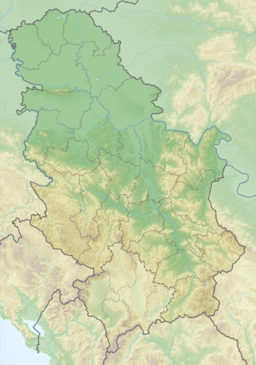Rovni Lake (Serbian: Ровни језеро, Rovni јezero) is a water reservoir in western Serbia, created by damming the Jablanica river. It is located between the villages of Stubo and Rovni, 15 km (9.3 mi) from the city of Valjevo. The construction of the Stubo-Rovni dam was completed in September 2015. The lake is an integral part of the regional water management system "Rovni" providing water supply for several cities: Valjevo, Lazarevac, Lajkovac, Ub and Mionica.[1]
| Rovni Lake | |
|---|---|
 | |
| Location | Valjevo, western Serbia |
| Coordinates | 44°14′28″N 19°45′17″E / 44.2411°N 19.7547°E |
| Lake type | Artificial |
| Primary inflows | Jablanica and Sušica rivers |
| Primary outflows | Jablanica river |
| Catchment area | 10.4 km2 (4.0 sq mi) |
| Basin countries | Serbia |
| Surface area | 2.5 km2 (0.97 sq mi) |
| Max. depth | 67 m (220 ft) |
| Water volume | 51.5 million cubic metres (41,800 acre⋅ft) |
| Surface elevation | 364 m (1,194 ft) |
| Islands | 0 |
Characteristics
editThe dam is a rock-filled with water-resistant clay core. It is 74.5 m (244 ft) high, with 450 m (1,480 ft) long crest. The total volume of the reservoir is 51,500,000 m3 (1.82×109 cu ft).[1] The works were executed by a joint venture formed by the companies "Hidrotehnika−Hidroenergetika" and "Energoprojekt Niskogradnja" plc, Belgrade, Serbia.[1] Area of the lake is 2.5 km2 (0.97 sq mi).[2]
Works began in the late 1980s, and by 2018, it is still not completely finished. It is estimated that the entire costs of the project amount to €80 million.[3] The conceived purpose of the project was multifunctional: waterworks supply, provision of the service water for the future thermal power station, protection from floods and keeping of the biological minimum of the river Jablanica and, downstream, of the Kolubara. In 2018 a new project was announced, which envisions the irrigation of 6,000 ha (15,000 acres) of arable land in the Kolubara valley, downstream from Valjevo (municipalities of Valjevo, Lajkovac and Mionica).[2]
The tests in March 2018 showed that the water is of high quality and can be used for the waterworks, but the infrastructure is not completed. The pipes connect Rovni with the water treatment facility Pećina near Valjevo. Pećino itself is connected with the Oštrikovac reservoir in the village of Slovac, where pipelines from Lajkovac, Lazarevac and Ub should connect. The arm which supplies Mionica will detach at the village of Divci. It is expected that the works will begin in 2019, and the set deadline is 2021.[4]
Controversy
editFilling of the accumulation caused a controversy when the public learned that it would submerge the Orthodox church of St. Michael in Tubravić, known as Valjevska Gračanica, originating in the 15th century. Despite the explanations by Serbian Patriarch Irinej and manager of the Public Utility "Kolubara" that the Church signed the contract and exchanged the property back in 1991, and that a replacement church had been built elsewhere, several public protests were held. However, the filling proceeded as planned, and the church got finally submerged on 15 March 2016.[5][6][7]
2014 floods
editThe lake is part of the Kolubara river watershed, as Jablanica is one of the headwaters which form the Kolubara, notorious for the flooding, especially of the town of Valjevo. Though it still wasn't completed, the reservoir was pivotal in protecting Valjevo during the 2014 Southeast Europe floods. The reservoir received the surplus of the water brought by the torrents and often flooded Valjevo suffered no damage. This fact was used in public debates about the lake, concerning the flooding of the church. The preventing of the flooding was often used as an exemplary of proper reaction in such situation, amidst the mostly weak reaction of the other parts of the protective system and the government in general (see Paljuvi Lake).[8]
See also
editReferences
edit- ^ a b c "Akumulacija Rovni". Hidrotehnika - Hidroenergetika. Retrieved 2016-03-18.
- ^ a b Slobodan Ćirić (11 March 2018). "Voda iz Stubo-Rovni za žedna polja u slivu Kolubare" [Water from Stubo-Rovni for thirsty fields in the Kolubara watershed]. Politika (in Serbian). p. 08.
- ^ Puzović, B. (17 March 2018). "Probni rad brane "Stubo-Rovni": Jezero gasi žeđ 300.000 ljudi". novosti.rs (in Serbian). Retrieved 17 March 2018.
- ^ Slobodan Ćirić (21 March 2018). "Voda spremna, cevovodi još u planovima" [Water is ready, pipelines still in plans]. Politika (in Serbian).
- ^ "Potopljena Valjevska Gračanica uprkos protivljenju vernika". Blic. 16 March 2016.
- ^ "Hram koji će biti potopljen čuva najstarije zvono u Srbiji". Blic. 7 September 2015.
- ^ "IKONE PLIVAJU U PRLJAVOJ VODI Potopljena i unutrašnjost manastira Valjevska Gračanica". Blic. 9 March 2016.
- ^ Branislav Radivojša (30 November 2017), "Uljezi pored rečnih tokova" [Intruders along the water routes], Politika (in Serbian), p. 08
